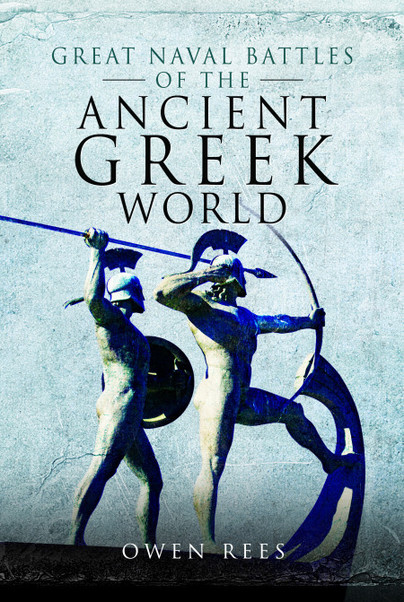
Great Naval Battles of the Ancient Greek World. By Owen Rees. Pen and Sword, Barnsley, 2018.
Reviewed by Gregory P. Gilbert
MOST modern readers have had very little exposure to the experiences of the ancient world. If history is more than one or two hundred years old then it is mostly considered irrelevant. If that were true we would be relying upon less than 5 per cent of our past experience. Much of our deep past continues to resonate today. ‘Great Naval Battles of the Ancient Greek World’ is a good example.
This book is an introduction to the sea fighting of Classical Greece. It covers the one hundred years from 494 BC to 394 BC when Athenian sea power – largely in the form of three-oar banked warships (known as triremes) – influenced events across the Eastern Mediterranean. Throughout Classical Greece times sea power was the dominant forces. In Athens and many of its allies sea power underpinned democracy, while the trireme rowers themselves were the backbone of the lower-class voters.
Owen Rees has brought together the information in a variety of ancient sources to produce an interesting collection of thirteen naval battles from ancient Greece. Rees starts with a thorough introduction which describes triremes, their crew, and naval tactics – including the diekplous, kyklos and periplous. Rees then goes on to describe each naval battle starting from the Battle of Lade and ending with the Battle of Cnidus. Each chapter deals with a single naval battles by giving background, the forces involves, a description of the actual fighting, and the aftermath. This is a fascinating and helpful way of presenting such information. Where appropriate the author lists the relevant paragraphs in the original sources – mostly Herodotus, Thucydides, Xenophon and Plutarch – and I would suggest that if time permits the reader should also try and read these original paragraphs to gain greater insight. Copies of the classical Greek sources are available online. Rees puts together a few conclusions mostly to highlight the fact that ancient naval warfare is much understudied. He highlights a few tactical lessons, which are probably not all that relevant today, while many of the essentials – leadership, people, technology and strategy – remain important even now.
One major concern that I have with ‘Great Naval Battles of the Ancient Greek World’ is that the decision to concentrate upon battles does not provide an adequate coverage for the importance of sea power to Classical Greece. For example while the book includes the Persian Conflicts (494 to 480 BC), with emphasis on the three naval battles of Lade, Artemisium and Salamis, it does not include the subsequent Greek naval expeditions against Persia and the important Battle of Eurymedon (469 BC). Here I will restate my warning that when trying to better understand sea power it is always better to consider naval campaigns instead of naval battles – battles at sea are rarely, if ever, decisive rather it is naval campaigns that count. In 480 BC the Classical Greeks used naval forces to defeat a Persian invasion – this was effectively a sea denial campaign. After the Persians withdrew from Greece (479 BC) the Greek states agreed to send their naval forces to attack Persian forces occupying eastern Mediterranean islands and along the coast of Asia Minor – this was effectively a sea control campaign. Of course the Persians maintained their sea control in the waters off Rhodes, the Levant and Egypt.
‘Great Naval Battles of the Ancient Greek World’ is a quick and informative read. It is the type of book that makes one think of how one would have coped in similar situations. It is not an overly scholarly tome although it does rely upon the ancient sources. This book is recommended as a good way to take one’s mind off the day-to-day minutia of modern life, and to think about how naval battles were fought two and a half thousand years ago. Go for it!



